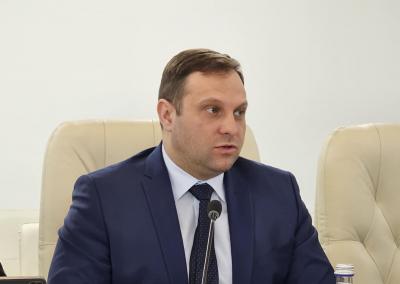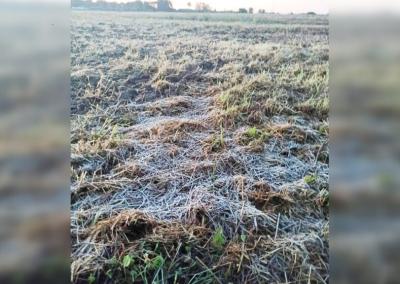I. Hofman: Farmers affected by frost can expect EU compensation next year
Some 6,000 hectares of the country's orchards and berry-growing areas have been affected by spring frosts, and more than half of the harvest has been completely destroyed, according to the Minister of Agriculture, Ignas Hofmanas. However, he said, farmers can only expect to receive part of the European Commission's (EC) compensation for their losses next year.
„It was already clear from the start that the damage would be severe, with unusually long frosts and extremely low temperatures, down to 10 degrees below zero in places. Finally, the extent of the affected area is becoming clear – almost 6 thousand hectares of orchards and berry-gardens have suffered damage. Of these, 4.5 thousand hectares have seen their crops completely destroyed," Mr Hofman said in the programme "ELTA Corner".
When the government declared an emergency due to frost at the end of May, it opened the way for the farmers' losses to be compensated from the state budget and for European support to be discussed.The Minister said that this process could take time and that gardeners and berry growers may have to wait until next year to be compensated for their losses.
„Processes take time, unfortunately. It would be very good and we will work to ensure that they receive at least part of their compensation by the end of this year. Let's understand – if they have suffered damage, they have no income, and the farmer not only has to earn a living, but also to maintain the farm, to carry out timely work and even to pay the workers“, – explained I. Hofman.
„The other part of the compensation, in that case, I would expect to be paid already next year. However, I can't say anything concrete right now because we are still at the beginning of the process“, – he added.
According to the minister, part of the compensation would come from the European Union's (EU) crisis fund, which is open to all EU members, so there is no guarantee that Lithuania will be able to receive part of the support.
„The fund compensates for losses caused by frost, floods and all other climatic disasters. Let's understand that all EU countries can apply for the fund, so we are trying to do everything as quickly as possible before the fund is shared," said Mr Hofmanas.
Frost may have affected all year's harvests, says Hofmann
I. Hofman said that the data currently collected does not reflect the full situation, because while some crops were completely destroyed, fruits that are still ripening now, such as apples and pears, may also have been affected.
„The final damage will become clear in the autumn, as the season is still in full swing – flowering has just finished. The fruits are growing, then they have to ripen and then the full picture will be visible," the minister explained.„Even if the fruit is picked and grows, it is possible that it will be affected by frost, which can lead to changes or defects that will make the product look worse and cost less, the industry said. This also contributes to losses," he said.
Frost and other disasters are becoming more frequent and unpredictable in Lithuania, and farmers need to find new ways to protect themselves, he said.
However, the Minister said, effective and reliable crop protection measures are very expensive, so the State cannot contribute to their purchase for the time being, and farmers should look for alternatives.
„This is a very expensive investment. (...) It is likely to be unaffordable for farmers without state support – it is costly and takes a long time to pay off. (...) But I do think that where we can adapt or use some protection – that's what we have to do. Farmers will not survive on compensation," reasoned I. Hofmanas.
„In the current period we do not have the funds for such investments. Unless we make it a priority in the future, in the new period. There are a lot of things in the country that require finance now," he added.
ELTA recalls that the government declared a state-level emergency at the end of May due to the spring frosts, which severely affected the harvest of berries and early vegetables.
After a record warm second decade of April, when the average air temperature in Lithuania reached 12.4 degrees, a positive anomaly of 5.7 degrees (a record high of 29.1 degrees was recorded on 18 April), the European Union is now in the midst of a cold snap. The active growing season in almost all parts of the country started almost 2 weeks earlier than usual.
However, in the last week of April, temperatures plummeted and since then the country has been experiencing severe and prolonged frosts.
This adverse weather has caused severe damage to gardens and berry orchards, many of which were already flowering and in some places already bearing early fruit.















































































































